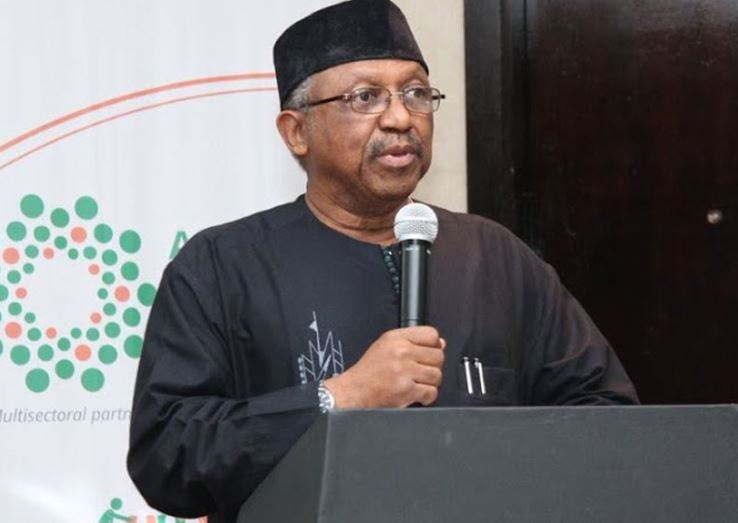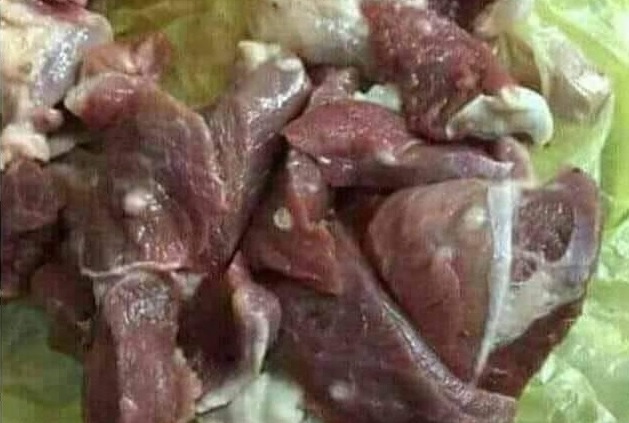One of every six Africans is Nigerian, according to widely cited calculations, but that may underestimate Nigeria’s share of the continent’s population. Many of the country’s 200 million people live and work at close proximity in large cities and are squeezed into the poorest communities. Consequently, Nigeria’s experience with the global pandemic is being closely watched.
The minister of Health, Dr. Osagie Emmanuel Ehanire, in regular press conferences that are broadcast live, is providing a clinic on how to address fears and provide information and explanations of what the federal government is doing to respond to SARS-CoV-2 (also called new Corona virus) – the pathogen that causes COVID-19 disease. Ehanire held his 23 March meeting with media outdoors in the capital Abuja, with journalists widely separated under a shade cloth. He answered dozens of questions, gave situation updates, outlined the government’s policies and procedures, and explained the science behind the decisions government is making.
The minister’s background in medical practice, research and teaching, and in the philanthropic and private sectors, is on display in his conversations with journalists. He studied medicine in Munich, Germany and attended the Royal College of Surgeons in Ireland and is certified in trauma surgery. Among the places he has worked as a medical professional and advisor are the University of Benin Teaching Hospital, the Shell Petroleum Company and the board of the T.Y. Danjuma Foundation.
Minister Ehanire has stressed that information from research around the world is evolving rapidly, and that Nigeria’s planning and policies will change in response to the latest evidence. He appealed to all media to check facts, not to spread dangerous rumors and to be part of the national effort to provide their readers, viewers and listeners with accurate information that can save lives. To protect journalists, the ministry will issue rotating press passes for alternate days for the daily health briefings.
Highlights of what the minister said on Monday (paraphrased, organised and condensed for brevity):
1). Cases as of midday Monday – 36 COVID 19 cases reported, of which 32 were imported by travelers, 26 of those with a travel history in high-burden countries; six cases in people who traveled with or were associated with the travelers who became ill; and four cases of unconfirmed origin, raising the possibility that there may be what is called ‘community spread’ – from person-to-person among people who have not traveled.
2). Two people have been treated, have recovered and have been discharged. The first case, an Italian who was the first to test positive, was identified within 48 hours and placed in an isolation facility that was ready to receive cases. Tracing that person’s contacts found 179 people. One of those tested positive for COVID19. Both have been cured and discharged. Of the remaining cases that have been identified, all but one is clinically stable, and the one is dependent on oxygen.
3). Since news of the outbreak in Wuhan, China, the ministry of health has been preparing, looking at patterns of spread and at our own resources. We requested and received federal government support to start preparing and procuring. We started preparing and procuring. We have placed orders for additional supplies and are expecting deliveries. I have just met with multi-lateral partners who can help Nigeria procure additional medical supplies and assist with logistics, and we are expecting deliveries. Today, according to United Nations agencies, medical supplies donated by [Ali Baba founder] Jack Ma, arrived in Addis Ababa, for the African Union to distribute to every country.
4). The behavior and pattern of the disease is becoming clearer over time. We are focused on trying to identify all cases in people who arrived from outside Nigeria and to trace all their contacts. The aim is to prevent and slow the spread within the country.
5). We are asking anyone who arrived within the last two weeks to alert us. We ask anyone who knows someone who has traveled in a country with a high rate of COVID19 to tell us. You won’t be punished; you won’t be arrested. But we need to trace your contacts, and we will ask you to isolate yourself for 14 days. If people refuse to isolate themselves when asked, we may need to begin forced isolation. If you have been in high-burden countries, we will give you supervised isolation. Citizen engagement is important. Every citizen’s responsibility is to protect oneself, one’s children, the family, and the community. We depend on that sense of responsibility.
6). If you test positive for COVID19, we will give you treatment and discharge you when you are well. Treatment includes supportive case, such as intravenous drips and oxygen, when needed. [In response to a question about testing labs not being well-distributed around the country, potentially disadvantaging some regions, especially in the north of Nigeria] In the beginning, we had only one lab – in Abuja – capable of diagnosing tests sent to it. And even that had no reagents (substances needed for test analysis) at first. Now we have six functioning labs. We have an efficient courier system to quickly move test samples to the labs. One diplomat has told me of having only five labs in the country to test for COVID19, but that is sufficient, unless the system is overwhelmed. One of the many reasons we urge social distancing and hand washing and not touching your face is so that our labs are not overwhelmed. We are expecting to need more PCR (polymerase chain reaction) machines (which can evaluate small amounts of DNA in the samples that are sent to labs) as the testing level grows. We will need more reagents to make them work.
7). We are working day and night looking at what countries are doing, what treatments are being tried, and at results and reports. We are always looking at the best options for our country. For example, one of our centers is preparing to try chloroquine to see if it does work. [Some political leaders in Europe and the United States have promoted chloroquine-based drugs, citing good outcomes in a few dozen people who were given chloroquine, combined with the antibiotic azrithomycin.]
8). Tests of drugs in vitro – in a laboratory – may look promising, but a drug may not act the same way inside the human body. Giving a drug to a very small number of people may point to things we can try, especially in desperate situations where a patient is becoming unstable, and doctors want to try anything that might help. We learn from that, but it is not a clinical trial. It doesn’t give us solid information about a drug’s effectiveness. By scientific observation, up to 80% of COVID19 patients survive. Did the drugs help? We don’t know. The person may have improved in any case.
9). Why have we closed airports to international arrivals but didn’t closed our land borders? Because the priority has been the most likely carriers of the virus, who arrive by air. We did find one person who came across a land border – an adventurer, a motorcyclist riding around Africa. But we believe that is rare.
10). The Nigeria Centre for Disease Control is coordinating the response and is functioning at a very high level. It is coordinating contact tracing and guiding most of the government’s response. They do not sleep! I personally call many times a day, sometimes in the middle of the night. [The Nigerian Center for Disease Control (NCDC) was established after Ebola spread to Nigeria and was successfully contained. Its head, Dr. Chikwe Ihekweazu is an epidemiologist – a public health professional who tracks the spread of disease. He was founding editor of Nigeria Health Watch, an AllAfrica content partner, and he was a member of a World Health Organization visit to China to study and learn from China’s response to COVID19.]
11).The majority of recent travelers are Nigerians, not Chinese or Italian. We hope that closing airports to international flights will reduce our need to deal with imported cases and allow us to focus on dealing on transmission within the country – and therefore reduce the need for intensive care. Every citizen must help. We all have to work very hard and be disciplined.
Source: All Africa
*The views of the above article are those of the author and do not necessarily reflect the views of Africa Speaks 4 Africa or its editorial team.



